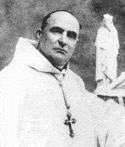 The present scandals in the Church have many people looking for positive solutions to the multifaceted problems which beset the Bride of Christ, not realizing that the true solution will only come from Our Lord Jesus Christ Himself, His life within us and fidelity to His teachings. The Soul of the Apostolate is a book, which not only shows how this is possible, but the way it is to be accomplished.
The present scandals in the Church have many people looking for positive solutions to the multifaceted problems which beset the Bride of Christ, not realizing that the true solution will only come from Our Lord Jesus Christ Himself, His life within us and fidelity to His teachings. The Soul of the Apostolate is a book, which not only shows how this is possible, but the way it is to be accomplished.
No commentary on this book would be complete without a word about its author. Jean-Baptiste Chautard was born in the French Alps on March 12, 1858. His father was a nominal Catholic who ran a little bookstore, but his mother made sure that their children were educated in the Catholic faith. Jean Baptiste eventually went on to study economics at the University of Marseilles where he had an experience which would change his life forever.
While walking across the campus one day Jean Baptiste happened upon a priest praying his breviary. This priest was unaware of the impression he was making on the economics student. “His bearing, full of respect and religion, was a revelation to me,” said Dom Chautard, “and produced in me an urgent need to pray from then on, and to pray in the way this priest was praying. The Church appeared, concretized, so to speak, in this worthy minister, in communion with his God.”
This incident led Jean Baptiste to change his life and become a man of prayer. Such is the impact of a man who truly practices the interior life. Only then can the person say with Saint Paul, “I live, now not I, but Christ liveth in me.”
 Learn All About the Prophecies of Our Lady of Good Success About Our Times
Learn All About the Prophecies of Our Lady of Good Success About Our Times
Later he joined a Catholic club on campus founded by the saintly Father Jean-Joseph Allemand. It was in this association that he found the supernatural brand of Catholic Action which solidified him in the path towards a greater union with God. One day while in prayer at the tomb of Father Allemand, he received his calling to the priesthood and in 1877 entered the Trappist Abbey of Aiguebelle, north of Avignon.
Jean Baptiste did not enjoy the contemplative life of a monk for long. Shortly after being made deacon, his superior sent him on a very important mission to Paris to save the community from financial ruin. His eloquence and knowledge of economics proved useless in this undertaking. He was forced to have recourse to a nearby shrine where he threw himself at the feet of Our Lady of Victories. Thirty minutes later, he emerged from the shrine to be greeted by a total stranger. “Are you a Trappist?” the man asked. “Can I be of any assistance to you?” The rest of the story can be guessed. Aiguebelle was saved and Jean Baptiste learned another valuable lesson he would later utilize in forming his unique spirituality.
He was eventually ordained and became “Dom” or Abbot Chautard of the motherhouse of one of the most important abbeys of the Trappist Order, Sept-Fons.
In the first decade of the 1900’s he was faced with another great challenge. The Church in France was attacked by the French Government, this time under Georges Clemenceau, who because of his hatred for Church, closed down many religious orders in France. Abbot Chautard however faced Clemenceau and his enemies with such fearlessness that the order was spared.
Reflecting on the persecutions against the Church at that time, Dom Chautard noticed a big mistake among Catholic leaders of the time. They were fighting against the enemies of the Church by using worldly and political weapons: newspapers, magazines and conventions. The growth of the Church was measured by the amount of new buildings being built and the amount of money in the coffers. While these material means are helpful and even necessary these Catholics failed to realize that God’s Church is above all built of living stones not just mortar and brick. Success was measured in very materialistic terms when what the Church really needed were saints. But saints are made only by the grace of God.
In 1907, Dom Chautard published a little pamphlet titled “The Apostolate of Catechism and the Interior Life.” He pointed out that the most important ingredient for the rebirth of zeal in a country where the Church is being persecuted is the preaching of the fundamentals of the Faith by people imbued with the interior life. The arguments in this little treatise formed the cornerstone for The Soul of the Apostolate.
The book is quite simple, containing very profound yet long forgotten truths. Its fundamental goal is to convince the reader that “we must never leave the God of works for the works of God and that Saint Paul’s: ‘Woe unto me if I preach not the Gospel’, does not entitle us to forget: ‘What does it profit a man, if he gain the whole world and suffer the loss of his own soul?'”

Book: The Soul of the Apostolate
With an abundance of scripture quotes and examples from lives of the saints, Dom Chautard shows how it is possible to preach the Gospel and save one’s own soul, by becoming real men of interior life. He gives powerful arguments to back up this point and proves how interior life is not lazy, selfish or detrimental to a truly fruitful apostolate done for the salvation of souls.
To understand the effectiveness of interior life, consider the fact that, “a single burning prayer of the seraphic Saint Theresa (as learned through a highly creditable revelation) converted ten thousand heretics.” Without leaving her convent, she did that which “activistic heretics,” even the most eloquent ones, could never do.
A bishop of Cochin-China once said to the Governor of Saigon: “Ten Carmelite nuns praying will be of greater help to me than twenty missionaries preaching.”
The bottom line is there must be a harmony between the active life and the interior life. Saint Bernard explains this balance using the very interesting metaphor of the reservoir and the channel. “The channels let the water flow away, and do not retain a drop. But the reservoir is first filled, and then without emptying itself, pours out its overflow, which is ever renewed. We have many channels in the Church today,” Saint Bernard added sadly, “but very few reservoirs.”
The devil however knows the value of interior life and will often grant the apostle “a purely superficial success” if he can only prevent him from making true progress in the interior life. Dom Chautard calls these “successes” sapphires then wisely points out that the devil will gladly trade a few sapphires of the active life for the diamond of interior life.
A Victim Soul: The Life of Mother Mariana de Jesus Torres
The interior life is very well defined as “the state of activity of a soul which strives against its natural inclinations in order to REGULATE them, and endeavors to acquire the HABIT of judging and directing its movements IN ALL THINGS according to the light of the Gospel and the example of Our Lord.”
Such seriousness about spiritual matters would be impossible without something Dom Chautard calls “custody of the heart.” – the “habitual or at least frequent anxiety to preserve all my acts, as they arise, from everything that might spoil their motive or their execution.”
To keep such a strict custody over the heart and therefore practice a solid interior life, one must absolutely avoid letting the agitation of daily life disquiet the soul and lead to dissipation. That is why Dom Chautard gives so much importance to rising, when possible, at the same time every morning, and beginning the day with morning mental prayer.
He who faces the day by hitting the floor running, really does not believe in his fundamental contingency on God. Dom Chautard rebukes such people saying, “To hear these mighty men of works talking about their exploits, one might imagine that God Almighty, to Whom it is child’s play to create worlds, and before Whom the universe is dust and nothingness, cannot get along without their cooperation.”
Such is the importance of morning mental prayer for those who want to attain a vibrant interior life that St. Theresa of Avila said that, “he who practices mental prayer has traveled half the journey. However he who does not practice at least fifteen minutes of mental prayer a day is an animal.”
Saint John Francis Regis: The Saint for Father’s Day
This may seem like “pie-in-the-sky” considerations for all those who look upon the present situation in the world and Church and yearn for action. They see prayer and contemplation as a waste of good time.
This is not true. The power of the interior life is impressive. Is it not true that tepid souls suddenly become fervent? The mysterious wind of supernatural life fills the sails of their souls once again and no one seems able to explain what caused such a transformation. Likewise, no one could explain how Jean Baptiste, the economics major, became a priest and later abbot of the most important abbey of the Trappist order, facing and overcoming the obstinate Clemeceau along the way.
One cannot logically explain how such a transformation could take place except with the doctrine so admirably laid out in his book The Soul of the Apostolate.
Such spiritual change is open to all men, even those most weighed down by the trials and tribulations of the modern world. Dom Chautard affirms this truth when he says, “No matter what my condition may be, if I am only willing to pray and become faithful to grace, Jesus offers me every means of returning to an inner life which will restore to me that intimacy with Him.”
Oh, with what sweetness does he illustrate how the words of Isaias will be fulfilled in those who acquire such intimacy. “Then shall thy light break forth as the morning, and thy health shall speedily arise, and thy justice shall go before thy face, and the glory of the Lord shall gather thee up. Thou shalt call, and the Lord shall hear, thou shalt cry and He shall say: ‘Here I am.’ And the Lord will give thee rest continually, and will fill thy soul with brightness and will deliver thy bones, and thou shalt be like a watered garden, and like a fountain of water whose waters do not fail.”


